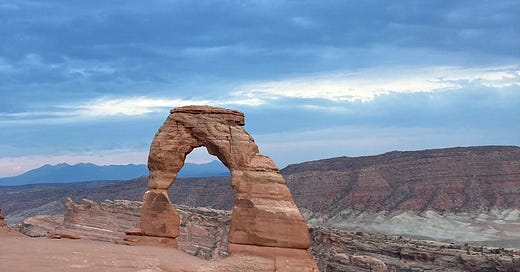Love notes from Siel is a weekly newsletter. If you love it, subscribe for free.
Dear friend —
Up until the last minute, I didn’t see it at all. I first had to drive through Moab, then hike a mile and a half up the shadeless rock slopes of Arches National Park, then scoot past one final perilous-looking drop-off to finally be face to face with it: Delicate Arch.
And if you want to see this beauty too, you better act fast. Because who knows how much longer it’ll be around?
“All arches are but temporary features,” I recently learned from a National Parks Service webpage. It was a news article about the collapse of Wall Arch (due to natural causes), which until 2008, was another major attraction at Arches. Alas, I arrived 13 years too late to see that one — and I’m too late for many other natural wonders around the world too, many of which have succumbed in recent years to climate change. Famous glaciers, famous seas, famous islands — so many are melting or drying up or drowning.
And people are dying all over from climate change too these days — crushed in their sleep in Florida, overheated in the Northwest. Floods, fires, and heat waves are hitting wealthier nations now, which has more government leaders talking about doing something about it all.
Yet life just goes on, mostly as it always has, for many of us.
Isn’t it strange, how normal day-to-day life feels in an apocalypse?
Resting at Delicate Arch, I met a big family that had all hiked up together: kids, their middle-aged parents, and the grandparents who complained gently that this hike was really too much for them, they were old now. The fam was from Massachusetts. They’d flown into Denver, driven to the Grand Canyon, seen Zion National Park, and were now in Moab. A few days later, I visited the Grand Canyon myself and met an older couple while waiting for a tram. These two were from the Bay area, on a two-week vacation through Vegas, Grand Canyon, Zion, Moab. Everyone I ran into seemed to be on a grand tour of the west’s national parks, like we were determined to see it all while we still could. Who knew when another virus would trap us in our homes, or another degree of warming turn an already-hot spot unvisitable?
I’d been worried, especially due to my recent fainting incident, about getting heat stroke at the Grand Canyon, but the Saturday of my visit was an unusually cool one for July, temps in the mid-80s. I walked around the south rim, took a hike down Bright Angel Trail, and rode the scenic tram to Hermit’s Rest where I ate a gigantic chocolate bar.
These are such strange times. Places where people have lived for a very long time are slowly becoming uninhabitable, with insurance companies in Florida threatening to cancel coverage for older buildings and the Louisiana government relocating entire communities from flood-prone areas. Now seems, in fact, a very unattractive time to buy houses most anywhere — as they could very well end up being uninhabitable in the not too distant future.
Yet the real estate market is also going crazy right now. People paying more than half a million dollars for a mass-produced home in a subdivisions. In a suburb in Idaho.
To me, now seems like a good time to be a nomad, not tied down to any one place that could disappear overnight in a fire, a sinkhole, a building collapse. Don’t own a house, or even rent an apartment, and you don’t have to worry about your home flooding or burning up. I could still get struck by disaster wherever I am, but as a light traveler I wouldn’t lose much — unless disaster kills me, in which case I suppose I won’t care much what I’ve lost. Assuming I’m alive, I could just move on easily to the next, less disastrous place —
I don’t know. Maybe my thinking has gotten too all-or-nothing of late. Spend days taking in natural wonders and nights reading clifi, and the imagination starts getting a tad dramatic.
Tell me — what are you afraid will disappear?
Love,
Siel
Three links you might love:
How Grand Canyon National Park will look in 100 years. Eight experts discuss how climate change and other “existential crises” may change this preserve.
A chatbot ghost. A guy created an AI of his dead fiancé via a chat website. It’s like that Black Mirror episode except less hi-tech and more real life….
Aloneness isn’t loneliness. “In reality, loneliness has less to do with being alone and much more to do with the experience of feeling unseen.”






Our Puget Sound southern resident orcas and the salmon they need to survive. The sage grouse in Eastern Washington. Stone fruit, berries and grapes. :(